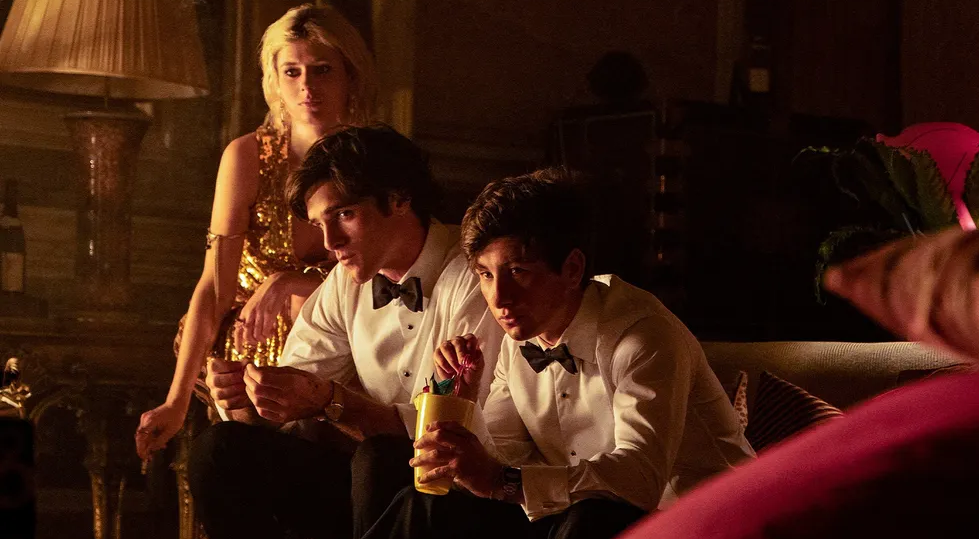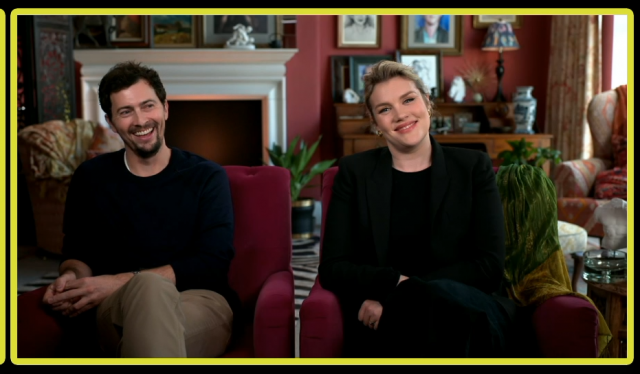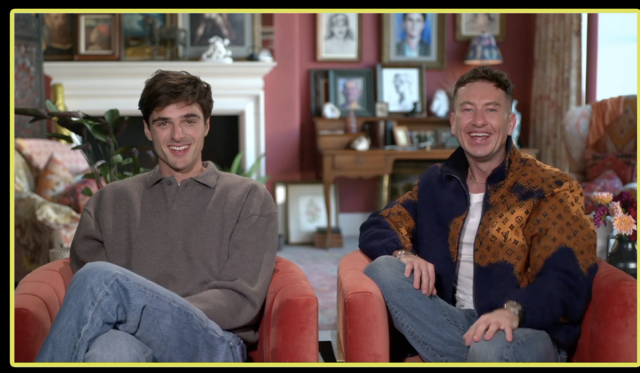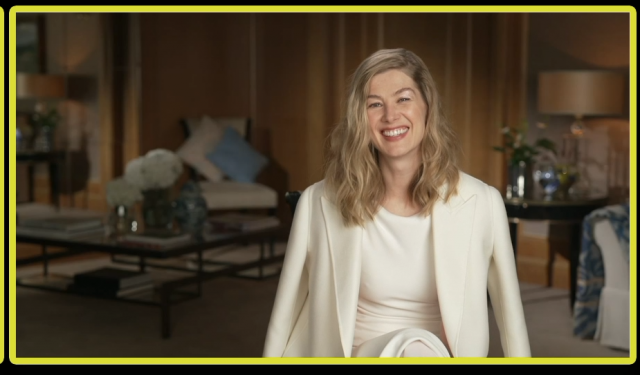Filmmaker Emerald Fennell on 'Saltburn': 'It is about a desire that is completely insatiable'

Actress-turned-filmmaker Emerald Fennell never stops to impress us.
After her directorial debut with the thriller "Promising Young Woman" (2020) for which she won the Academy Award for Best Original Screenplay and received nominations for Best Picture and Best Director, Fennell now wrote, directed and produced the black comedy psychological thriller "Saltburn" which has received a number of critical accolades.
Set in England in the mid-2000s, it follows scholarship student Oliver Quick (Barry Keoghan) who is discriminated upon by his rich classmates at Oxford University for his perceived poverty. Oliver, however, gains the trust and friendship of popular and wealthy student, Felix Catton (Jacob Elordi) who invites him to spend the summer at his family's sprawling estate, Saltburn. Complications arise as Oliver befriends and gets closer to Felix and his family.
Aside from Keoghan and Elordi, other members of the cast include Rosamund Pike (Lady Elspeth Catton, Felix's mother), Richard E. Grant (Sir James Catton, Felix's father), Alison Oliver (Venetia Catton, Felix's sister), Archie Madekwe (Farleigh Start, Felix's cousin) and Carey Mulligan (Pamela, Elspeth's friend).
ComingSoon.net wrote, "This is a riveting experience that sucks you into its world and characters and achieves a lot with its premise.
Fennell immerses you into a world teeming with enigmatic characters, a pulsating narrative, and a visual style that's as captivating as it is unique. At the heart of this magnetic experience are the compelling performances of Keoghan and Elordi, whose on-screen chemistry forms the spine of this absorbing tale. Keoghan portrays our protagonist, and he has a tricky job at the center of this film. He is magnetic and effortlessly engaging. He breathes life into an alluring and mysterious character, drawing viewers into his world with a charm that's hard to resist. His portrayal invites audiences to latch onto his intriguing journey, which develops a lot from the beginning to the end."
Digital Journal said of Fennell's sophomore film, "This movie immediately calls to mind The Talented Mr. Ripley as one observes a less fortunate guy ingratiate himself with the most popular boy, adopting his lifestyle without hesitation. While Oliver focuses on being a part of Felix's life rather than taking it over, the parallels are clear. The film begins by contemplating whether Oliver loved or was in love with Felix and the answer, audiences discover, is complicated. Felix's kind heart makes him vulnerable, and Oliver's difficult childhood makes him easy to pity. Together, they make the perfect pair to give and take, becoming fast friends destined to hurt each other.
"Writer-director Emerald Fennell's second feature-length film is somewhat subtler in its criticism, but is still playing with stereotypes and exploring complex character motivations."
We were able to talk to director-writer-producer Fennell, producer Josey McNamara, actors Keoghan, Elordi and Pike in a press conference and below are excerpts of that interview.
Josey McNamara (Producer) and Emerald Fennell (Director, Writer, Producer)

Emerald, how did you assemble the cast? You have the best of the best here.
Emerald Fennell (EF): In many ways, it's kind of similar to dating. What you're looking for is chemistry. You're looking for that element of surprise. So, I like to meet people first, talk to them and see if we're going to get into it. That we're going to have a good time, that we're going to trust each other, that we're going to be able to really get under the skin of something and get inside something. So that's the first stage. And then also, obviously we're talking about actors who are supremely, supernaturally gifted.
Barry is a person who the closer you look, the further away he gets. It's the most brilliant, brilliant talent. We needed Oliver to be incredibly enigmatic, incredibly alluring, incredibly complicated. Barry's a genius. Then, you have Rosamund, the funniest, most gifted comic actress in the world. Jacob, a genius. Richard, a genius. Archie and Alison are two of the most gifted actors in the world. And it is Alison's first film.
Josey, what surprised you about their performances?
Josey McNamara (JM): I was really impressed with everyone's dedication to the movie in terms of what we were doing. Credit to Emerald about how she speaks to the movie and how she distills her vision to people, because everyone really understood from day one the movie we're trying to make, and where we want to push and where we want to pull.
It was great to see everyone invest themselves in the movie every day, and not be afraid to do anything or try anything and be very malleable as well.
Emerald, what was it like knowing you had such a kinetic talent like Barry Keoghan at your disposal and you had to figure out how to make the most of him in this movie?"
EF: It was thrilling. Because he is a force of nature. Barry is like lightning in a bottle. It's a very unique and specific talent that he has. The thing that you're always looking for is that element of surprise. The texture of a performance is as much as the texture of the couch they're sitting on. That is something that is really important.
What I love are things and people that go against the grain. That's what Barry does. We as humans are not consistent characters. We have our own idiosyncrasies. We respond to things surprisingly. We are turned on by the things that we don't like, and we're disgusted by the things we should. That's this movie, and that's what Barry does. He can get inside something. He's probing. It is an extraordinary thing.
So much of my work as a director is giving people the things that they need. For me and Barry, so much of it, by the end had a sort of telepathy. It's kind of like sometimes, I would just give him a look, and he knew what I meant.
Josey, what was it that surprised you about Barry's performance, or just knocked your socks off in seeing him work with Emerald?
JM: There was great trust between the two of them. Just seeing that fearless nature that he had, that he embraced everything that we wanted to do and that we were talking about. He always understood that it was a character first, and everything had to be generated through that. He was willing to go as far as he needed to maintain that throughline.
The film presents a very intriguing paradox between one's pursuit of acceptance against someone else's politics of personal power. So how willing do you think we are to become something we are not just to get approval and appreciation? And is there a danger there?
EF: Our life is spent in the pursuit of approval from other people who will never give it to us.
That is the thing. That is being human. All of us are dedicated to that pursuit. We are all enormously slippery and changeable. Whether it's seduction, the way you present yourself when you're trying to seduce someone, the way you present yourself when you're trying to ingratiate yourself with a friendship group, whether you're trying to ingratiate yourself with a collection of critics through the medium of television, we are all looking for approval.
All of us are looking to please. I'm very interested in that power dynamic always. It's the root of our society.
Oliver is such a fascinating character to be at the center of the story. One who really stays with you long after the movie is over. Telling this film from his twisted perspective, it's such a cool choice, but what is it about Oliver that spoke to you as a writer and creative?
EF: Oliver feels incredibly relatable to me.
He kind of announced himself about seven or eight years ago kind of persistently. He's sort of like an imaginary friend. He was just there all the time, and I couldn't get him out of my head. It's no accident to me that I finished writing this during COVID-19.
This is a film about looking constantly and not being able to touch, and what it does to you if you're not allowed to touch the thing you want to touch.
We were living in a world where we could only look at each other through screens, where we were constantly voyeuristic, that we were absorbing things that couldn't see us back. Oliver seems to be kind to all of us, really. Yes, he's an outsider. Yes, he's a person driven by love and desire and all of those things. But he's also trying to scratch an itch that just cannot be sated. It can't be scratched.
So, what do you do? You scratch your skin till you get down to the bone. You do it till it hurts.
That's what he felt to me so much like the embodiment of everything that I was feeling at the time.
Why set the story in 2006 particularly? Why was this so important?
JM: Personally, that's the time I was at the university.
It was incredibly relatable for me to see those textures play out. It was really fun for me to experience it. There were certain elements that if you think about, smoking indoors, I think it was the last year you were allowed to smoke indoors. So, there are these little things that we could add that really built the fabric of the movie.
EF: It's a period drama that isn't a period drama, which is very useful kind of satirically.
To have just a little bit of distance is helpful. It also is necessary to the structure of the gothic British country house movie, that it is a person looking back over a time that changed their life, whether it's The Go-Between or Rebecca. Or even, you know, looking at something like The Great Gatsby, you have a similar thing, an outsider, a young man who claims to be an observer but is actually instrumental in the story. So, it always needed to be set to some degree in the recent past, but also has a very humanizing effect.
Most part of the story is set in the summer of 2007. That was exactly 15 years from when we were filming it. The thing about 15 years ago is it didn't look glamorous. No matter how rich, how beautiful you are, 15 years ago, wherever you are in time, it's not back in fashion, so it's not cool yet. It's not close enough that it looks the same. It gives it a very humanizing effect when you see the most beautiful person in the world with a Livestrong bracelet and a Carpe Diem tattoo.
When you're talking about these supernaturally beautiful, rich people, you do need to add that humanizing quality.
This is your second film with Carey Mulligan. Can you talk about her participation? Did you write this with her in mind? Does it create shorthand?
EF: She's an extraordinary person and the most gifted actress. I sent her the script just as my friend once it was finished. I wanted to talk to her about it. She immediately called me up and said, "I have to be 'Poor Dear' Pamela."
I was like, "You're only in three scenes." She was like, "I don't care." The thing is, absolutely, it's all of those things. You have shorthand. You have trust built in. I can completely understand why as a director you want to find your team. Whether that is with the actors or with the crew, the thing that you are doing all the time is to have that shorthand, is for when you say to your production designer, "Oh, sorry, I'm so sorry I didn't explain the suckling pig is dressed as a man, and the man rotating the suckling pig is dressed as a pig so the pig will need glass eyes and false eyelashes and, you know."
And your production designer just says, "Oh my God, of course," you know, rather than, "You're insane. What's wrong with you?"
So, it's all of that. Then the thing about Carey, the thing about "Poor Dear" Pamela is she's an unbelievably important character in this film because she could so easily be an object of derision. She's treated so abominably. She's the person who knows she's outstayed her welcome and has nowhere to go, so she has to suffer the indignity of their derision every day. The thing is, is that Carey, she's so gifted as a comic actress, it is such a genius comic performance, but it is also one of the most devastating, kind of poignant ones.
She's the human collateral of this family. So, we really needed someone with Carey's gifts to give her that kind of specificity.
How did you guide Barry Keoghan on his nude scene towards the end, so he felt relaxed? Do you have a choreographer? Did Barry spontaneously create his moves? How did that final scene come together?
EF: The scene was always from the beginning kind of going to be one of our complicated technical and precise things, because it's the inverse of Felix's tour at the beginning. So, it was always that we had the kind of introduction to Saltburn from Felix and that kind of single shot, and then the reverse of Oliver coming out of the king's bedroom with Henry VIII's bunk on it, where he is now sleeping, and then walking into the sort of the great hall.
So technically, it was always going to be precise. And so absolutely, it's about making sure that somebody feels safe and relaxed and all of that. We had Polly Bennett, who is an unbelievably talented choreographer. She does a lot of movement as well as dance. And she did, kind of "Elvis" and "Bohemian Rhapsody" and "The Crown," all those sorts of things. So, what I was really looking for was something that felt spontaneous, that felt loose enough that it was a burst of evil joy that we could really relate to, but that also had enough precision that it just didn't feel messy.
And the thing with Barry, again, that is so wonderful is that when he gets it, he gets it. When you say to him, I don't think the end can be a walk through the house, a naked walk through the house. It needs to be a dance to Sophie Ellis-Bextor's "Murder on the Dancefloor." And Barry just says, "Yeah." But he says no. My God, he knows how to say no. So, when he says yes, he says yes, and he's all in.
When did he say no?
EF: It's not like there was something that was too transgressive for him to do. It's not at all that. What I mean to say is, like all good actors, he has boundaries. He has things that he likes doing, and enjoys doing, other things he doesn't. So, what I mean is that when he says yes, which is most of the time for everything, but when he says yes to something like this, you know what you're getting is absolute dedication. And that's why it's so effective is that he's also a genius physical actor.
As a screenwriter as well as a film director, how do you deal with bold and difficult decisions in writing a character, especially Oliver?
EF: Oliver is our hero. The nature of this movie is that it is complicated, because it is about desire, and it is about a kind of desire that is completely insatiable, and what that does to you. It is a tragedy, really. But the tragedy for me, for Oliver in a way, is that he is an expert. He has a gift for knowing what people want and of giving it to them.
And the pleasure is kind of derived from that like act of service. But what he wants is always slightly out of his grasp. And I think the thing is when it comes to the kind of sex and intimacy in this. He is absolutely a person who is in love with Felix, but he desires everyone. Like, all of us should watch this film and want to both sleep with and murder every character.
You know, the idea is for people to leave the movie tingling and not knowing whether that feeling is good or bad. And so of course, I'm always conscious of things like that. I'm very, very conscious of trying always to be as careful and as thoughtful as I can be. But also, I want to make things that feel human, that feel complicated, that feel difficult to put in any box or label, and so that's always the kind of creative endeavor that you're working towards.
Jacob Elordi (Felix Catton) and Barry Keoghan (Oliver Quick)

Barry, Emerald Fennell spoke about your absolute fearlessness and your conviction on how to play Oliver. Could you give us some examples of when that fearlessness and conviction came into play for you on this set?
Barry Keoghan (BK): If it drives the story forward and if it you know if it's the right thing for the character to do and it's not just thrown in there because it's out there or it's different if it has to move the story for me.
In terms of being fearless, I just want to show maturity, how I commit to my craft, that I'm taking it seriously, that I'm willing to make choices that elevate me as an actor and push me in.
What did this film story inspire or bring about your own thoughts and reflections on male friendship or about your own experiences?
Jacob Elordi (JE): I've had such strong friendships in my life just across the board. I don't know if it changed anything for me, it just bought me a new friend. Friendship is friendship.
Barry, can you talk about the last scene in the film and how freeing that moment was?
BK: It was definitely free. It was nice to be given the space to do that. Since it's like your average thing to do and you basically, you're vulnerable. And you've got no clothes on, and you strip down and you're quite exposed. Once you get that comfy space and that license to be silly, I'm playing with it. It was fun.
Jacob, tell me about being on location with everyone and what was special about that experience?
JE: The castle was kind of everything. So many rooms. Rosamund lived there while we were filming.
We were pretty close with the people that run the house. It was like we were having The Midsummer Night's party.
Every single day we get dropped off at those big gates. They'd open up and our cars would drive in and we'd all get out.
It was just pretty much playing all day which room were we going to be and what were we going to be doing should we try this down here. We had so much freedom to just run around. Emerald gave us the space to be these overgrown kids.
Rosamund Pike (Lady Elspeth Catton)
 Rosamund, you've been asked many times about your first conversation with Emerald and how that didn't really prepare you for what was in store during the filming. I wonder if you could elaborate a little bit more about when you realized that this was going to go much further than you anticipated.
Rosamund, you've been asked many times about your first conversation with Emerald and how that didn't really prepare you for what was in store during the filming. I wonder if you could elaborate a little bit more about when you realized that this was going to go much further than you anticipated.
My research for this role was quite intense because Elspeth does absolutely nothing. So, it was very important for me to clear my decks, go on vacation, sit by a pool, decide what swimsuit to wear, order a few cocktails and order some magazines on eBay, it's not that easy, from 2007, and read them. And as Elspeth says, think about all the people who were in the magazines who weren't her, because her vanity knows no bounds. And that was that was preparation. But it was when I came back from that vacation and landed in the house that we filmed Saltburn at and I had opted to stay in the house itself. I opened my curtains and there were the catering trucks outside and I thought, oh have I made a terrible mistake? Just like that line in the movie, "Many people get lost in Saltburn." It's, you'll never leave. I was like, I'm never leaving because the ground is huge, I don't have a car and I'm stuck here. It was kind of mad and intense, but it was a wonderful decision because the family was so generous. I had a bedroom in the house. I never saw all the rooms in the house. There were whole staircases I never even entered upon. It was, whatever you're picturing as to the scale of this house, just quadruple it.
Was there a template for you in creating Elspeth? Have you witnessed someone like her that helped you bring her to life?
I definitely have. Growing up in the UK, and at various times being in those sorts of milieus, yes, people who've made me uncomfortable. It was interesting for all those times when I've been made to feel uncomfortable, all this kind of payback. The people who you don't quite know what you've done wrong, but you know that there's something about you that doesn't fit. So, to be on the other side of that, even the way somebody can say, you tell them you've done something, and they say, how clever. And you know that's not a compliment, even though it's a nice word, and it should be nice, it somehow isn't. It's that person. And I've seen it and I've been around it. The bizarre ways in which the English have this codified social behavior, and nobody tells you what the code is, but you certainly know when you when you don't play you know you break a rule, but you don't quite know what it is but you're aware that you know by the foie d'oeuvre that descends that you've done something wrong. So, it was really fun for me to be on the inside, keeping people out.
—MGP, GMA Integrated News

Need a wellness break? Sign up for The Boost!
Stay up-to-date with the latest health and wellness reads.
Please enter a valid email address
Your email is safe with us





